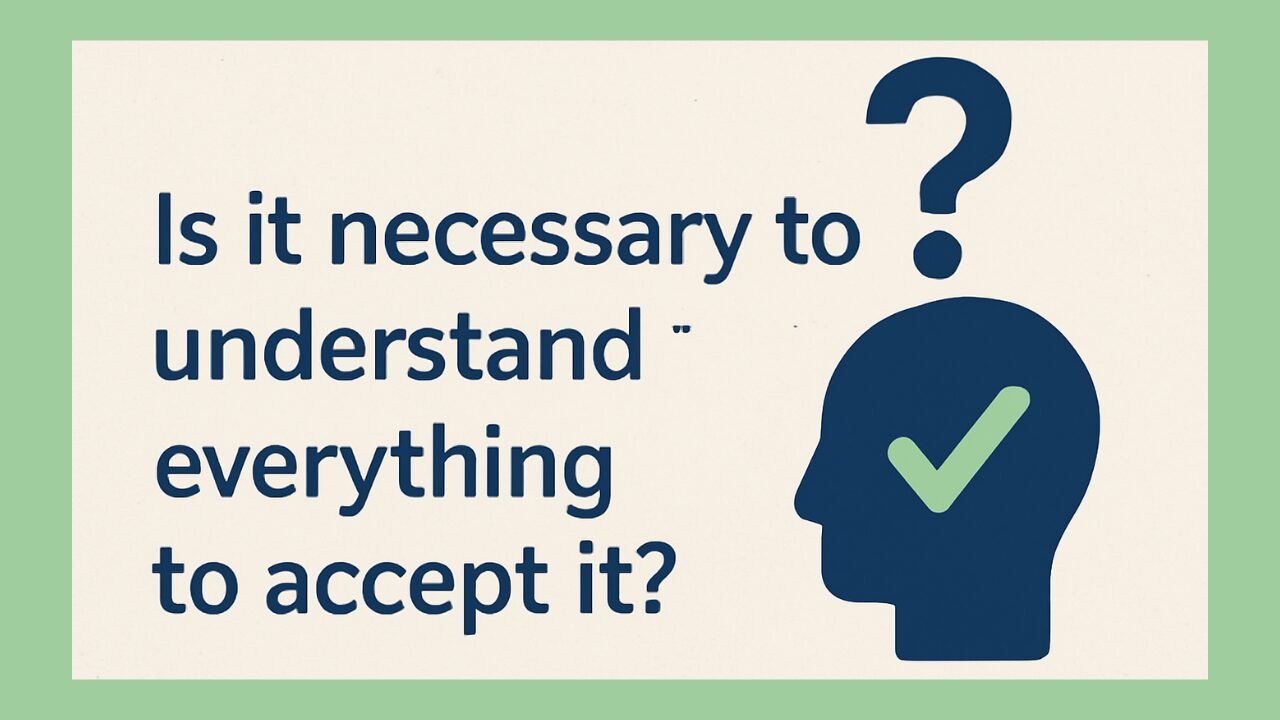Is it necessary to understand everything to accept it?

It’s in our human nature to question things and try to understand what lies at the core of what we don’t know. And so often we hear that to accept something fully, you should understand it first. Well… This can be true about so many things, such as understanding your childhood trauma or the source of your unhappiness.
But do we need to understand everything to ‘happily’ accept it? Let’s find out.
What does acceptance mean?
Acceptance is the act of agreeing with someone or something. It’s the act of recognizing one’s reality, truth, or condition without struggle or denial. And, let us add, without procrastination. Because what does procrastination mean if not the act of postponing acceptance? You can’t stop procrastinating without accepting that you absolutely MUST do that tedious chore from the list.
Why you don’t need to understand things firsthand to accept them
Let’s say you’re a highly anxious person. You don’t know why you’re nervous at the moment, but that doesn’t make the feeling less real. You might even decide to use a mental health app like Liven, the review of which you can read here in what is liven, to track the emotional state without a need to explain or fix it. And once you accept your anxiety, without even understanding it, you can look for therapeutic help and get to the root cause of your emotional state. See? In this case, understanding follows acceptance, not the other way around.
#1: You already accept multiple things without understanding them
At school, you were taught that the Sun is a hot mass, and no one knows whether time travel is possible. These are not simple truths! Just like the truth that in physics, white is a combination of all colours. Pretty mind-blowing, right? Yet, you don’t go every day getting into arguments with strangers on why things are like this and not that. You accept them.
#2: Understanding might never come for difficult emotions
Deeply traumatic experiences like grief or loss are challenging to accept as they don’t come with tidy explanations. You might be searching for answers in vain, but too often, the answers don’t exist, and the relief never comes. The longer you stay stuck in trying to understand, the longer you postpone healing.
#3: Feelings don’t always have logic
Feelings like anxiety or sadness often arise without a clear cause. The best thing to do here is to accept their presence. Emotions don’t always follow logic, and that’s okay. And, honestly, you don’t always have to understand them — sit with them, create some space for feeling, and release them further with a bit of meditation or breathwork.
#4: Some things are out of your control
First, you can’t control the actions or emotions of others. Second, you can’t always control life’s circumstances, such as unexpected changes, losses, or outcomes that destroy your peace of mind. As frustrating as that may be, the most empowering thing you can do is focus on what is within your control.
Let’s say someone has recently ghosted you. You may never understand why, but you can control how you respond to their actions. You can choose to prioritise your emotional well-being and focus on relationships that already offer clarity and support.
#5: You can accept reality but still disapprove of it
When you accept something, it doesn’t necessarily mean that you fully agree with what’s happening around you. In this case, you acknowledge the situation. And yes, this can still coexist with confusion or disagreement. For instance, you can accept the results of the election process, though they misalign with your beliefs and values. It doesn’t mean you stop advocating for change immediately — it just means you recognize the reality of the vote.
3 tips on how to accept things without fully understanding them
As you’ve already seen, the modern world teaches us to solve, fix, and explain everything. Unfortunately, that’s not always the case. Here are a few tips to help you accept things without needing much clarity.
#1: Practice letting go in small moments
Small wins build strength for bigger moments. Train your brain to release the need for logic in low-stakes situations. Let’s say you hear a song that makes you cry, but you don’t know why. Accept the tears. Or someone cancels last-minute. Let yourself feel annoyed, but don’t overanalyze it.
#2: Detach from closure culture
Our brain loves neat narratives, which include reasons, apologies, or satisfying explanations. No one owes you closure. Better think of closure as a gift rather than a guarantee that any relationship comes with.
Let’s say a company you work for makes a decision that impacts your role negatively. Sure, you may disagree with the changes, but once you recognize the decision has been made, you can move on and adapt accordingly.
#3: Give yourself time to understand naturally
Sometimes understanding comes with time, not force. Give yourself permission to live with uncertainty and trust that insights will arise later when you’re ready or when circumstances change.
For instance, you might feel confused and overwhelmed after a sudden breakup. Naturally, you’d struggle to make sense of what went wrong. However, won’t it be better if you allow yourself to feel and process the experience instead of rushing to find answers? Over weeks or months, as you heal and gain distance, you’ll get a better perspective.
READ MORE
Final thoughts
Understanding does wonders for your mind. However, it’s not always a prerequisite for your peace of mind. Sometimes, you, unfortunately, have to live with questions that will never be answered. Because sometimes, healing begins not with knowing, but with letting go.
